New Books from Routledge
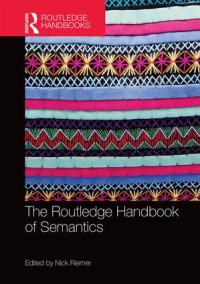
The Routledge Handbook of Semantics
Edited by Nick Riemer
© 2016 – Routledge
534 pages
About the Book
The Routledge Handbook of Semantics provides a broad and state-of-the-art survey of this field, covering semantic research at both word and sentence level. It presents a synoptic view of the most important areas of semantic investigation, including contemporary methodologies and debates, and indicating possible future directions in the field.
Written by experts from around the world, the 29 chapters cover key issues and approaches within the following areas:
- meaning and conceptualisation;
- meaning and context;
- lexical semantics;
- semantics of specific phenomena;
- development, change and variation.
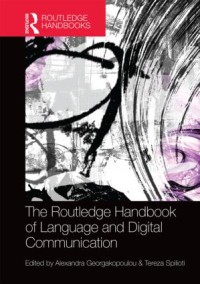
The Routledge Handbook of Semantics is essential reading for researchers and postgraduate students working in this area.
The Routledge Handbook of Language and Digital Communication
Edited by Alexandra Georgakopoulou, Tereza Spilioti
© 2016 – Routledge
434 pages
About the Book
The Routledge Handbook of Language and Digital Communication provides a comprehensive, state of the art overview of language-focused research on digital communication, taking stock and registering the latest trends that set the agenda for future developments in this thriving and fast moving field. The contributors are all leading figures or established authorities in their areas, covering a wide range of topics and concerns in the following seven sections:
- Methods and Perspectives;
- Language Resources, Genres, and Discourses;
- Digital Literacies;
- Digital Communication in Public;
- Digital Selves and Online-Offline Lives;
- Communities, Networks, Relationships;
- New debates and Further directions.
This volume showcases critical syntheses of the established literature on key topics and issues and, at the same time, reflects upon and engages with cutting edge research and new directions for study (as emerging within social media). A wide range of languages are represented, from Japanese, Greek, German and Scandinavian languages, to computer-mediated Arabic, Chinese and African languages.
The Routledge Handbook of Language and Digital Communication will be an essential resource for advanced undergraduates, postgraduates and researchers within English language and linguistics, applied linguistics and media and communication studies.
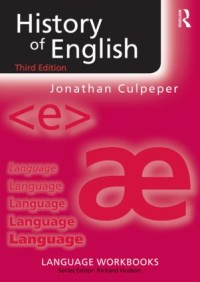
History of English
3rd Edition
By Jonathan Culpeper
© 2016 – Routledge
150 pages
About the Book
Routledge Language Workbooks provide absolute beginners with practical introductions to core areas of language study. Books in the series provide comprehensive coverage of the area as well as a basis for further investigation. Each Language Workbook guides the reader through the subject using ‘hands-on’ language analysis, equipping them with the basic analytical skills needed to handle a wide range of data. Written in a clear and simple style, with all technical concepts fully explained, Language Workbooks can be used for independent study or as part of a taught class.
History of English:
- examines the history of the English language in order to explain the English that is used today
- introduces key linguistic concepts
- provides ‘discussion points’ to generate debate
- encourages readers to think critically about the subject
- involves readers in collecting and analysing their own data
- contains a ‘mini-corpus’ of texts, used for exercises and to illustrate points raised in the commentary
Revised throughout, this updated edition integrates the latest research on the history of English, including an additional chapter on English letters and punctuation, and an updated bibliography. History of English, 3rd edition provides an essential introduction and workbook for students coming to this subject for the first time.
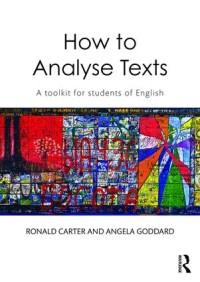
How to Analyse Texts
A toolkit for students of English
By Ronald Carter, Angela Goddard
© 2016 – Routledge
249 pages
About the Book
How to Analyse Texts is the essential introductory textbook and toolkit for language analysis. This book shows the reader how to undertake detailed, language-focussed, contextually sensitive analyses of a wide range of texts – spoken, written and multimodal. The book constitutes a flexible resource which can be used in different ways across a range of courses and at different levels.
This textbook includes:
- three parts covering research and study skills, language structure and use, and how texts operate in sociocultural contexts
- a wide range of international real-life texts, including items from South China Morning Post, art’otel Berlin and Metro Sweden, which cover digital and print media, advertising, recipes and much more
- objectives and skill review for each section, activities, commentaries, suggestions for independent assignments, and an analysis checklist for students to follow
- a combined glossary and index and a comprehensive further reading section
- a companion website at www.routledge.com/cw/goddard with further links and exercises for students.
Written by two experienced teachers of English Language, How to Analyse Texts is key reading for all students of English language and linguistics.
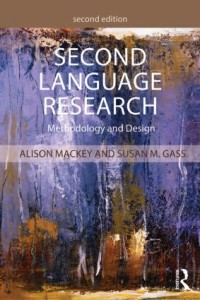
Second Language Research
Methodology and Design, 2nd Edition
By Alison Mackey, Susan M. Gass
© 2016 – Routledge
434 pages
About the Book
In this second edition of the best-selling Second Language Research, Alison Mackey and Sue Gass continue to guide students step-by-step through conducting the second language research process with a clear and comprehensive overview of the core issues in second language research. Supported by a wealth of data examples from actual studies, the book examines questions of what is meant by research and what defines good research questions, covering such topics as basic research principles and data collection methods, designing a quantitative research study, and concluding and reporting research findings. The second edition includes a new chapter on mixed-methods, new "time to think" and "time to do" text boxes throughout, and updates to reflect the latest research and literature. Supplementary materials, including an extensive glossary and appendices of forms and documents that students can use in conducting their own studies, serve as useful reference tools, with suggestions on how to get research published reemphasizing the book’s practical how-to approach. Second Language Research, Second Edition is the ideal resource for understanding the second language research process for graduate students in Second Language Acquisition and Applied Linguistics.

Please check the Methodology & Language for Secondary Teachers course at Pilgrims website.


|